Islamic Prayer Times: 11 Things You Need to Know
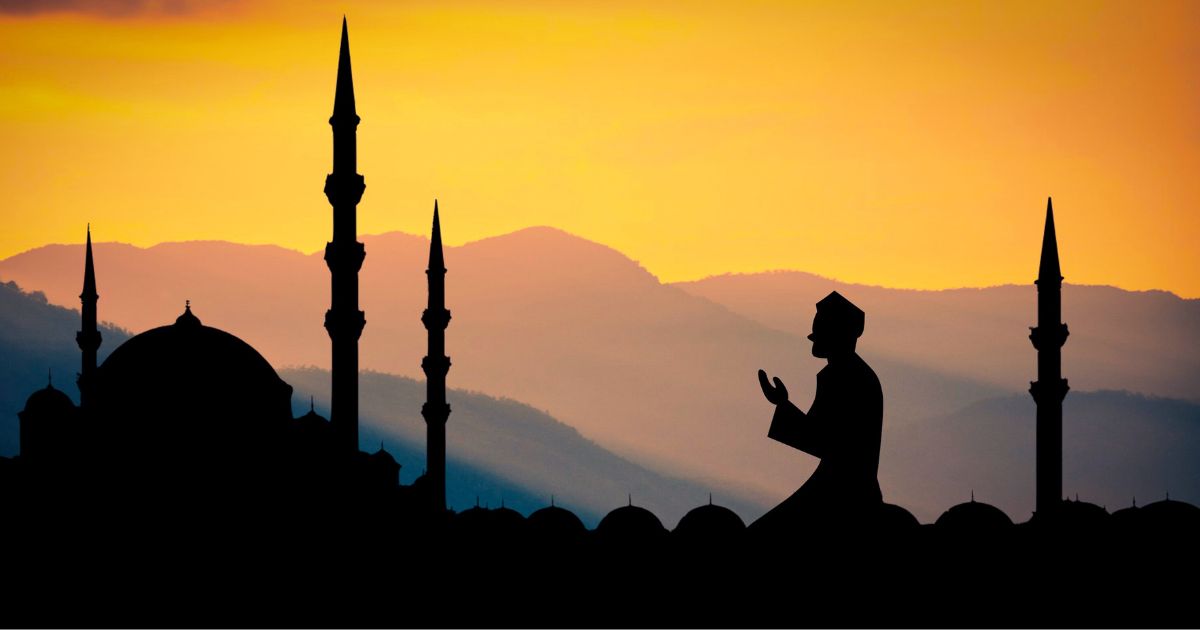
In Islam, the five pillars are the five essential values that Muslims must uphold in order to be faithful followers. These pillars represent the core Islamic beliefs that Muslims must uphold to organize their way of life, faith, and devotion. The pillars of Islam always come in order. The first pillar is Shahada. The next pillar is salah, or the daily ritual of Islamic prayer times. The third pillar is fasting, followed by zakat or charity, and the last pillar is hajj or Islamic pilgrim.
As we have previously stated, salah is one of Islam's five pillars, and it's thought that all Muslims should pray five times a day as a core belief and duty. Salah, or daily prayer, is significant for Muslims as a means of connecting with God and following in the footsteps of the prophets.
- Different Types of Islamic Prayer Times in Islam
- The Amount of Islamic Prayer Times in A Day
- The Fajr prayer begins at dawn and performs before sunrise
- The Dhuhr prayer occurs after the sun reaches its highest peak
- The Asr prayer takes place between midday and late afternoon
- The Maghrib prayer begins at sundown and may be done until the end of dusk
- The Isha prayer begins at night and takes place during the night
- How Are Islamic Prayer Times Determined?
- Islamic Prayer and Direction
- Do Islamic Prayer Times Change?
- What is Rakat and How Many Rakat in Each Prayers?
- The Fajr prayer consists of two rakat of Sunnah Muakidah and two rakat of Fard
- The Zuhr prayer, four rakat of Sunnah Muakidah, four rakat of Fard, two rakat of Sunnah Muakidah, and two rakat of Nafl
- The Asr, four rakat of Sunnah Ghair Muakidah, and four rakat of Fard Prayer.
- The Maghrib prayer, three rakat of Fard two rakat of Sunnah Muakida, and two rakat of Nafl
- The Isha prayer, four rakat Sunnah Ghair Muakidah, four rakat Fard, two rakat Sunnah Muakidah, two rakat Nafl and three rakat wajib.
- Shortening the Prayer
- Islamic Prayer Times in a Place with No Day or Night
- What is So Special About Friday Prayer
- Do Islamic Prayer Times During Ramadhan Change?
- The Holy Quran Insights of Islamic Prayer Times
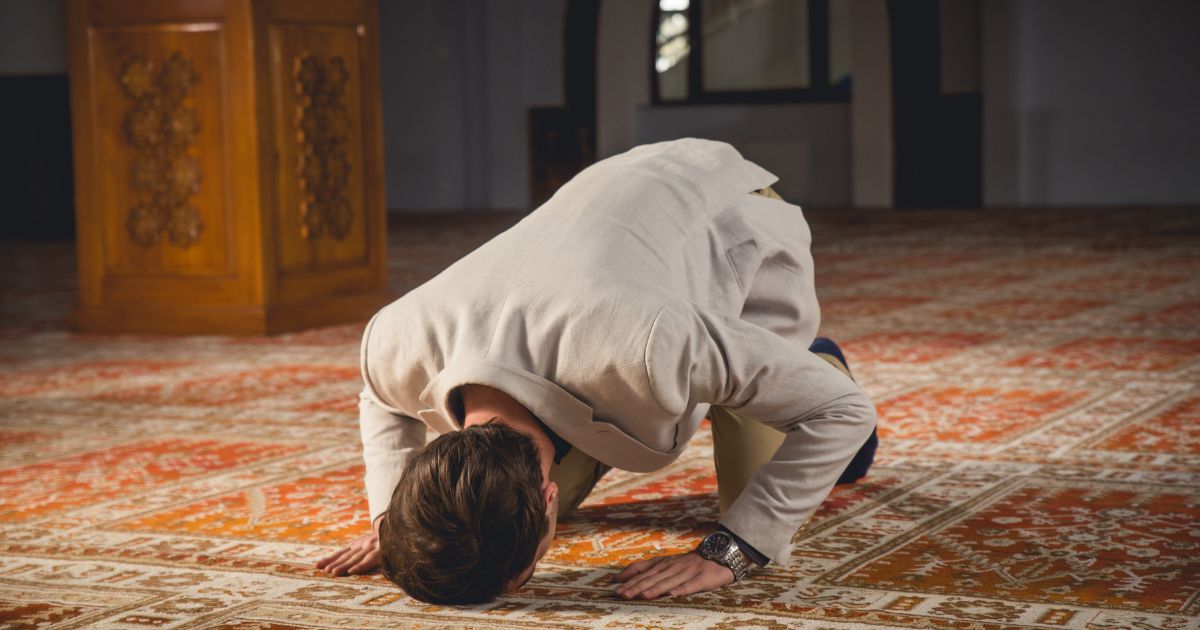
In Islam, there are four types of Islamic prayer times. Aside from the five mandatory prayers, there are various other prayers that Muslim use to express their love and thanks to the Almighty Allah SWT. The first type of prayer in Islam is the Fard or mandatory prayer. It's the prayers that are required daily for Muslims and include Fajr, Zuhr, Asr, Magrib, and Isha. Muslim individuals who do not perform these prayers on a daily basis may be considered sinners or non-Muslims.
After the mandatory prayers, the wajib prayers come next. Unlike the first Fard prayer, which Muslims are required to perform every day, this wajib prayer is not performed every day, yet it is still considered sinful to miss it. The following are the Wajib prayers; Tawaf prayer, Ak-Witr, and Eid.
Sunnah is the third of four forms of prayers in Islam. Sunnah prayers, in addition to mandated prayers, are required in Islam. Islam forbids willingly neglecting to perform these prayers. Sunnah prayers are classified into two types; Sunnah Muakkadah and Ghair Muakkadah. Any Muslim who performs Sunnah Muakkadah prayers will be rewarded, and leaving it out on purpose is nearly haram. Sunnah Muakkadah prayers include two rakat before Fajr, four rakat before Zuhr and two rakat after it, two rakat after Maghrib, two rakat after Isha, and four rakat before and after Jumuah.
While Ghair Muakkadah is a prayer that Rasulullah (PBUH) prayed on occasion, Muslims may or may not pray it at other times, such as Tahyatul Masjid, Rawatib, and Tahajud. Nafl prayers are among these forms of prayers performed in Islam for enhanced virtue. Missing the nafl prayers is not considered bad, but you will get more reward or credit if the Nafl prayers were performed. The Nafl prayers in Islam are Tahajjud and Ishraq.
There are obligatory responsibilities in Islam that Muslims must fulfill. One of these duties is performing the daily mandatory prayers.
أَقِمِ ٱلصَّلَوٰةَ لِدُلُوكِ ٱلشَّمْسِ إِلَىٰ غَسَقِ ٱلَّيْلِ وَقُرْءَانَ ٱلْفَجْرِ ۖ إِنَّ قُرْءَانَ ٱلْفَجْرِ كَانَ مَشْهُودًا
"Establish prayer at the setting of the sun till nightfall, as well as the Qur'an at dawn. In fact, the recitation of dawn is always observed." (Al-Isra', 17:78)
The daily salah is one of the five pillars of Islam, and It consists of the following prayers;
These five mandatory prayers are not just the basic daily prayer but also the daily practice of interacting and communicating with the Almighty Allah SWT. In addition to the five daily mandatory prayers, Muslims are also permitted to perform additional prayers, which we will discuss later in the next section.
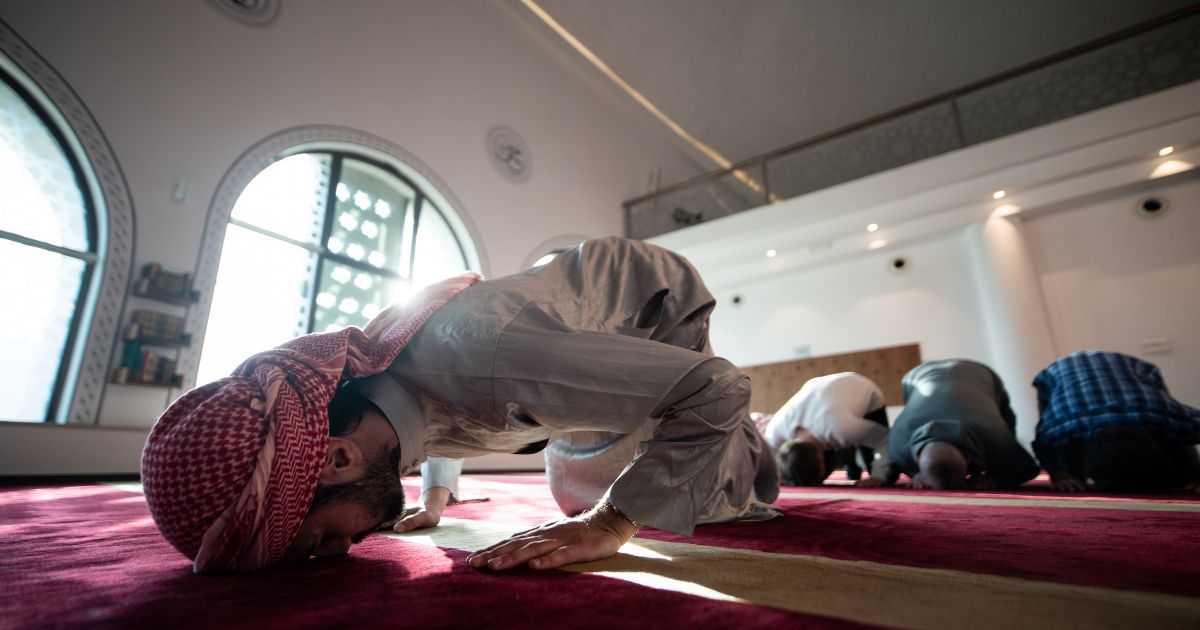
If you have observed the daily prayer timings of Muslims, you will notice that the Islamic prayer times are determined by the position of the sun. Historically, the traditional method of identifying Islamic prayer times was actually based on folk astronomy. Nowadays, modern Islamic schoolers determine Islamic prayer times by combining traditions with more advanced astronomical and mathematical expertise. For Muslims, the Fajr or early morning prayer begins when a line of light appears and spreads across the horizon. Dhuhr is the second prayer of the day, which is performed when the sun has reached its zenith after midday. Asr is also one of the five obligatory prayers done when the sun is halfway between noon and sunset. The Maghrib prayer begins when the sun has descended below the horizon. And the final prayer is Isha which is done when the reddish hue of the sky after the sunset vanishes.
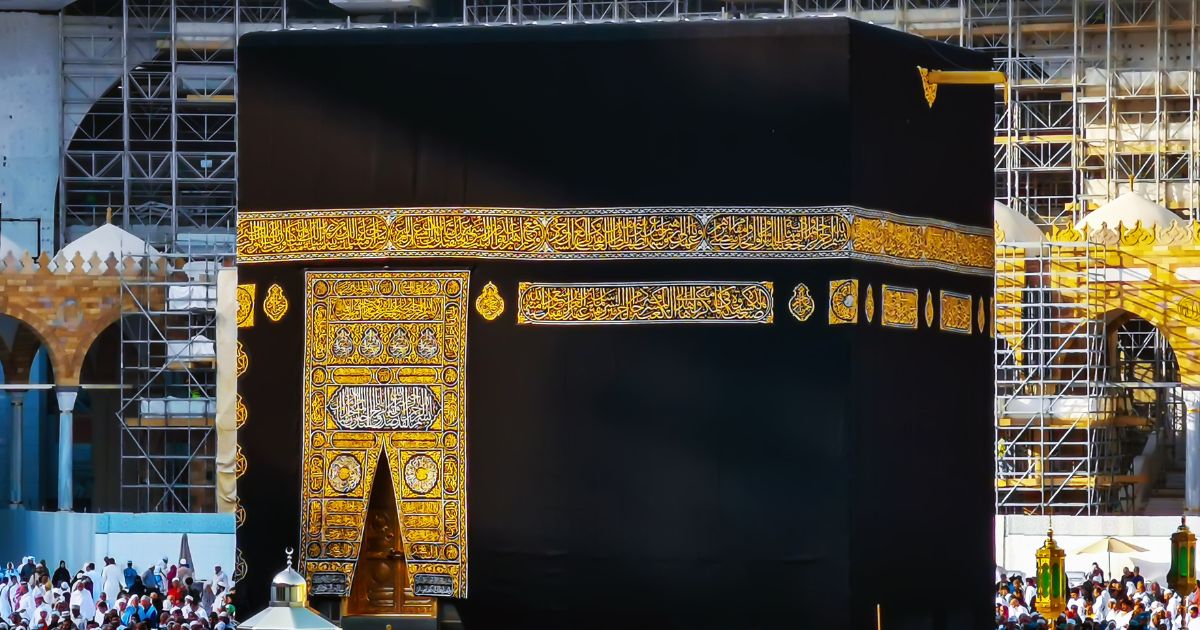
In Islam, there is a precise direction for praying known as Qiblah which is essentially a sacred direction toward the sacred Kaaba in Mecca. Muslims must face this way while praying, whether they are praying as individuals or in a congregation. In the early years of Islam, the Qiblah direction was historically directed toward Jerusalem (624 C.E). Two years after the Hijrah, Prophet Muhammad received a revelation from Allah instructing the prophet to change the direction to the sacred mosque Ka'aba in Mecca in which later revealed in Qur'an.
قَدْ نَرَىٰ تَقَلُّبَ وَجْهِكَ فِى ٱلسَّمَآءِ ۖ فَلَنُوَلِّيَنَّكَ قِبْلَةً تَرْضَىٰهَا ۚ فَوَلِّ وَجْهَكَ شَطْرَ ٱلْمَسْجِدِ ٱلْحَرَامِ ۚ وَحَيْثُ مَا كُنتُمْ فَوَلُّوا۟ وُجُوهَكُمْ شَطْرَهُۥ ۗ وَإِنَّ ٱلَّذِينَ أُوتُوا۟ ٱلْكِتَٰبَ لَيَعْلَمُونَ أَنَّهُ ٱلْحَقُّ مِن رَّبِّهِمْ ۗ وَمَا ٱللَّهُ بِغَٰفِلٍ عَمَّا يَعْمَلُونَ
In addition to obeying Allah's order, praying toward Mecca is thought to provide Muslims a sense of oneness and focus during worship. Although Muslims are commended for directing their prayers toward the Ka'ba, it should be underlined that Muslims address only to Allah in their prayers. Nowadays, the majority of Muslims determine the Qiblah location using technology and smartphone apps that are accessible for free.
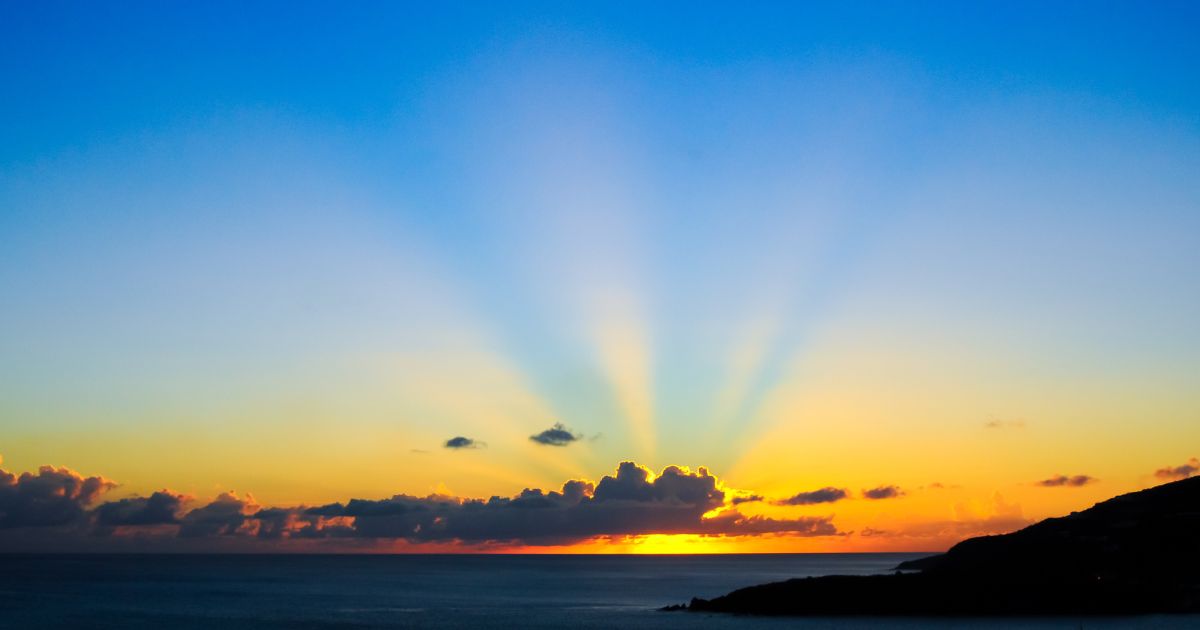
As we have explained earlier in the previous point, the Islamic prayer hour is determined by a complex mathematical and astronomical calculation that involves several variables. These variables include latitude, longitude, local time, and equation. Due to these complex variables, Muslim prayer times change every day by a small amount of a minute or less. While Islamic prayer times may seem confusing, Muslims can easily access numerous mobile apps and websites that remind them and help them determine which salah to perform at any given time of day.
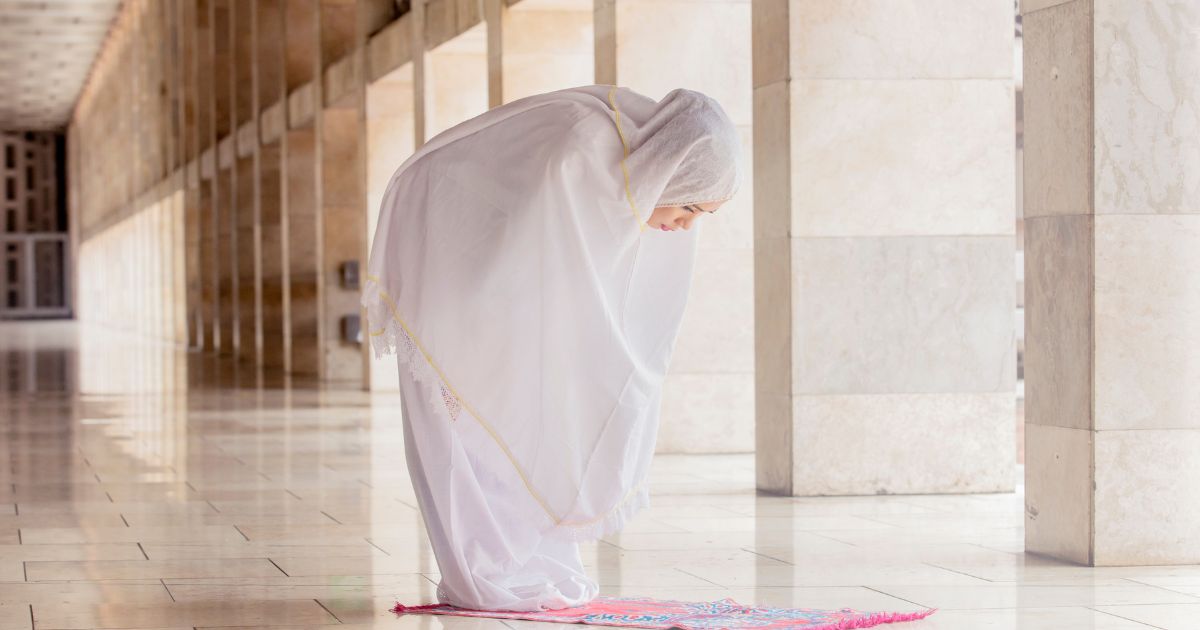
At this point, it has been clear that Muslims have to perform the mandatory prayer five times per day. But, each mandatory prayer requires a different number of Rakat. Rakat is the term that refers to the series of movements performed during the Salah prayer. In simple terms, Rakat combines ritual bows and prostration during salah, in which the holy Quran is also recited.
The first Rakat of Salah begins when the Muslim worshiper says Allah is the Greatest, which is known in Arabic as ٱللَّٰهُ أَكْبَرُ (read: Allahu Akbar) and is followed by surah Al-fatihah and a personal selection of any verses or chapters from the Quran. This action is then followed by a 90-degree angle bow and then back to the standing position. After that, the worshipper follows to do a full prostration on the ground. During prostration, the worshipper's forehead and nose must be flat on the ground. While prostrating, the worshippers place their palms shoulder-width apart to the right and left of their ears. The fourth movement is when the worshipper returns from the prostration to the flat-legged sitting position, repeats the prostration, and finally returns to the standing position. This series of motions is considered one Rakat.
Before performing any of the prayers, Muslims must conduct wudu, the Islamic practice of purification by cleansing the body parts.

While daily Islamic prayer may seem complicated for some, Islam is also tolerant of simplicity in the matter of worship. In fact, in Islam, shortening the prayer while traveling is a legal concession.
In Islam, it is permissible to shorten the prayer when traveling. Shortening the prayers when traveling is verified as a sunnah in Islam, which is also supported by the fact that Prophet Muhammad himself also shortened the prayers on all of his journeys, as described below;
"We went out with the Prophet (blessings and peace of Allah be upon him) from Medina to Makkah, and he offered his prayers with two Rakat every time until we returned to Medina" (Sahih Al-Bukhari 1081).
The Quran also mentions the shortening of the prayer as stated below;
وَإِذَا ضَرَبْتُمْ فِى ٱلْأَرْضِ فَلَيْسَ عَلَيْكُمْ جُنَاحٌ أَن تَقْصُرُوا۟ مِنَ ٱلصَّلَوٰةِ إِنْ خِفْتُمْ أَن يَفْتِنَكُمُ ٱلَّذِينَ كَفَرُوٓا۟ ۚ إِنَّ ٱلْكَٰفِرِينَ كَانُوا۟ لَكُمْ عَدُوًّا مُّبِينًا
"And if you are traveling through the land, there is no shame in shortening the prayer if you are afraid that those who do not believe will disrupt [or attack] you. Indeed, the disbelievers are always a clear enemy to you" (An-Nisa, 4:101).
It's also important to note that there are only two possibilities available when merging the prayers. While traveling, Muslims might either postpone Zuhr and pray at the time of Asr or advance Asr and pray at the time of Zuhr. Likewise, with Maghrib and Isha. The only prayers that cannot be combined are Fajr and Zuhr or Isha and Fajr.
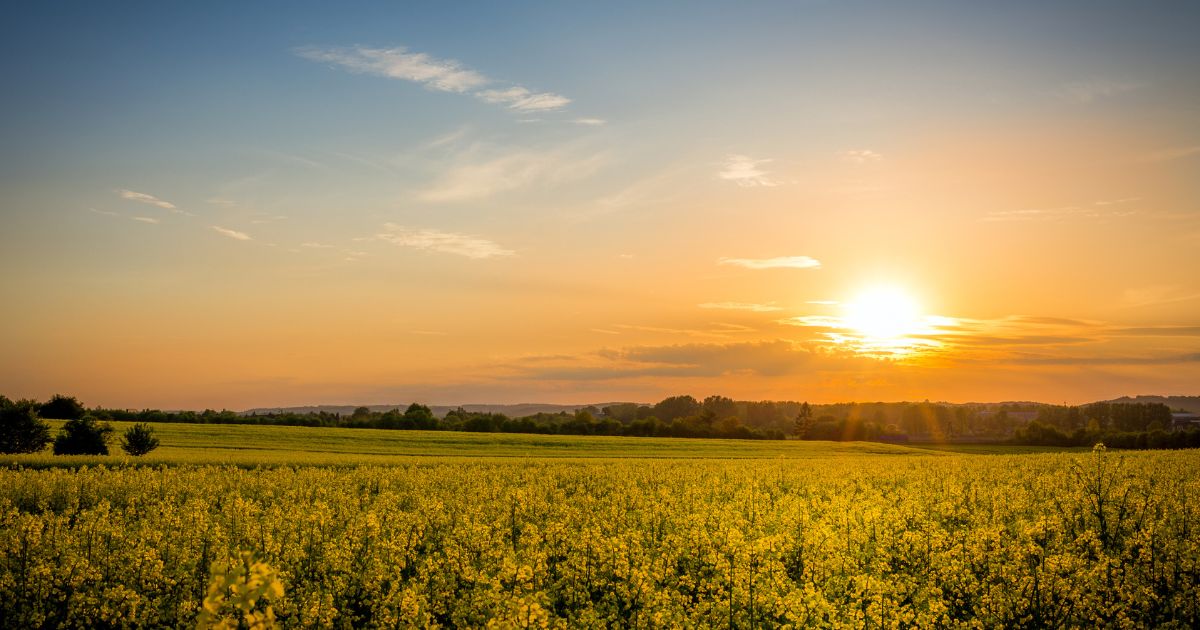
As stated previously, the daily prayers of Muslims are governed by the position of the sun. So, it begins to raise a question: how do Muslims pray in a land where the sun never sets?
In countries where there are 22 hours of sunshine and 3 hours of nighttime during the summer, determining the time for salah can be a little bit challenging. This is actually an issue that has been discussed in detail by many classical and modern Islamic scholars. There are actually two potential solutions that have been suggested to solve this problem.
The first method is that Muslims who live in countries where the sun doesn't set can pray according to the prayer timings of the nearest city where the prayers can observe the sun's movement, The other way for resolving this issue is to locate the local Muslim community and car in accordance with how their practice. And Allah knows best.
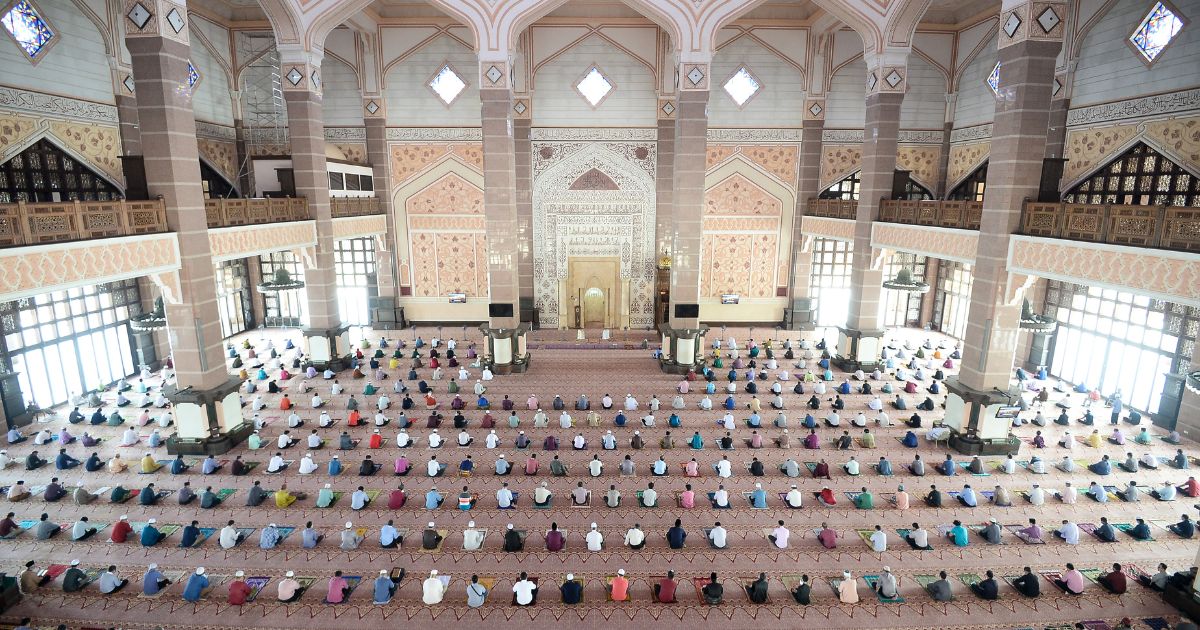
Every day, Muslims pray five times, but the most important prayer of the week is "Jumah", often known as the Friday prayer. So, why is the Friday prayer so important in Islam?
Al-Jumah, which means the day of the congregation and also means Friday in Arabic, is mentioned in the Quran in reference to the significance of the Friday prayer. Friday prayer is mandatory for Muslim men, and it is essential that Muslims not ignore Friday prayer because of work or other worldly matters. Why is it so essential for Muslims? Because Muslims believe that Allah chose Friday as a day dedicated to his worship alone. The Friday prayer service includes a sermon, which is typically delivered by a professional male Muslim preacher. However, in the West or other places where Islam is a minority religion, the sermon may also be delivered by a lay member of the community.
Muslims require around 15 to 20 minutes to complete the Friday service, which consists of a khutbah (the Islamic-speaking sermon) and the actual prayer. The number of rakat in the Friday prayer differs from the mandatory five-time prayer. As with the Jumah prayer, it consists of two fard rakat (prayed in congregation).
The significance of the Jummah prayer is further emphasized in Quran
يَـٰٓأَيُّهَا ٱلَّذِينَ ءَامَنُوٓا۟ إِذَا نُودِىَ لِلصَّلَوٰةِ مِن يَوْمِ ٱلْجُمُعَةِ فَٱسْعَوْا۟ إِلَىٰ ذِكْرِ ٱللَّهِ وَذَرُوا۟ ٱلْبَيْعَ ۚ ذَٰلِكُمْ خَيْرٌۭ لَّكُمْ إِن كُنتُمْ تَعْلَمُونَ ٩
O, believers! When the call to prayer is made on Friday, then proceed ˹diligently˺ to the remembrance of Allah and leave off ˹your˺ business. That is best for you if only you knew (Al-Jumu'ah, 62:9).
Referring back to the previous point, Islam has five primary requirements, known as the five pillars of Islam, which every Muslim must complete over his or her lifetime. One of the pillars is Sawn, which refers to fasting during the holy month of Ramadan. All Muslims of sufficient age and health must fast from sunrise to sunset throughout the month of Ramadan.
Muslims fast throughout Ramadan as an act of worship, to draw closer to Allah, to hone self-discipline, and to develop greater compassion for those in need. During Ramadan, Muslims continue to worship Allah as they do on any other day, but they are required to perform additional prayers in order to earn an additional reward. During Ramadan, in addition to the five daily prayers, Muslims spend many hours praying, including performing the special prayer called the Tarawih prayer.
After the Isha prayer, Muslims throughout the holy month of Ramadhan also perform the Tarawih prayer. Tarawih is a special prayer during Ramadhan that can be recited alone at home or in a mosque congregation. Tarawih consists of an even number of rakat, which are performed two by two. Even though the number of rakat is not specified, Tarawih is usually said with eight or twenty rakat, and the Witr is the last prayer to finish the whole Tarawih prayer.
Muslims not only perform Tarawih during Ramadhan. But Muslims also perform the Layat al-Qadr prayer. It is believed to be the night when Prophet Muhammad first received the Holy Quran. The exact date of Layat al-Qadr is unknown. Hence, the prophet encourage Muslims to seek for Layat al-Qadr blessings in the odd nights of the last ten days of Ramadhan.
As the second pillar of Islam, every Muslim is required to do salah. There are no acceptable explanations for Muslims to neglect salah. In the Quran, the establishment and significance of salah have been discussed more than anything else. Allah SWT states in the Quran:
يَٰٓأَيُّهَا ٱلَّذِينَ ءَامَنُوا۟ ٱسْتَعِينُوا۟ بِٱلصَّبْرِ وَٱلصَّلَوٰةِ ۚ إِنَّ ٱللَّهَ مَعَ ٱلصَّٰبِرِينَ
"So exalted is Allāh when you reach the evening and when you reach the morning" (Ar-Rum 30:17).
The Hadith View Toward the Importance of Salah
Aside from the Quran, hadith also mention the significance of Salah. Hadith, or الحديث in Arabic, is a collection of the Prophet Muhammad's sayings that the Muslims see as an important source of religious law and moral instruction. These hadith can assist you in comprehending the significance of Islamic prayer times.
"Abdullah asked the Prophet Muhammad (SAW) "Which deed is the dearest to Allah?" He replied, "To offer the prayers at their early stated fixed times" (Sahih Al-Bukhari 527).
The importance of salah is also stated in the following hadith;
"If there was a river at the door of anyone of you and he took a bath in it five times a day would you notice any dirt on him?" They said, "Not a trace of dirt would be left." The Prophet (ﷺ) added, "That is the example of the five prayers with which Allah blots out (annuls) evil deeds." (Sahih Al-Bukhari 528).
The significance of daily Islamic prayer cannot be overstated in Islam. In fact, performing salah is one of the five pillars of Islam described immediately after the first pillar, which is the declaration of faith. Salah became mandatory for all prophets and people. Regardless of one's conduct in life, the most important part of Islam is one's relationship with Allah. Through prayer, this relationship with Allah can be increased.